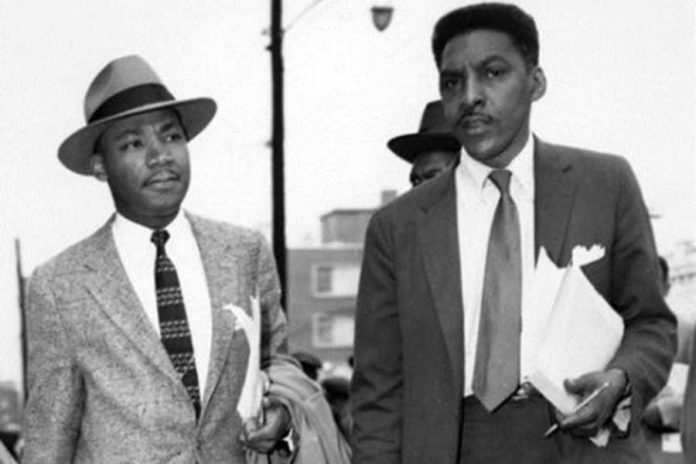Dr. Martin Luther King, Jr. is important to LGBTQ folks for a variety of reasons. During the civil rights movement, he used civil disobedience tactics and organizational methods that the LGBTQ community benefits from today. After gay marriage was voted down in New York in 2009, couples showed up outside of City Hall dressed in apparel they hoped to wear to their weddings. Sit-ins in county offices in states that didn’t allow gay marriage were organized across the country, ACT-UP went to the streets to protest in the early 1980s during the beginning of the AIDS crisis. Today, LGBTQ folks hold many events to further their own rights and stand in solidarity with immigrants and Black Lives Matter groups at rallies and protests that often feature activist speakers. Many of these strategies are those King deployed and developed.
King’s right-hand man, and the organizer behind March On Washington was Bayard Rustin, an openly gay Black man born in West Chester, Pennsylvania. A quaker, Rustin was keen on participating in a nonviolent civil rights movement. He was jailed in 1944-46 when he refused to serve in World War II. He was later jailed for “sex perversion” in 1953 and sentenced to 60 days in jail. In 2006, Bayard Rustin High School was founded in West Chester, after years of disagreements within the school board.
King’s fight for equality intersects with LGBTQ issues. In 2019, the Human Rights Campaign reported 25 transgender or gender-nonconforming people were “fatally shot or killed by other violent means,” including Philadelphia’s Tameka “Michelle” Washington. Of those, 23 were Black trans women. The fight we are having is not only against homophobia, transphobia and transmisogyny but also racism. Of those folks living with HIV and AIDS in Philadelphia, 42.2 percent are men who have sex with those assigned male at birth and 63.8 percent are Black.
LGBTQ youth are 120 percent more likely to face homelessness than their cisgender, heterosexual peers and Black youth have an 83 percent higher risk of reporting homelessness than their white peers, according to “Missed Opportunities: Youth Homelessness in America” from Chapin Hall at the University of Chicago. When we look at issues impacting the LGBTQ community, it’s necessary to look at the intersectionality of race and how that can inform our response and actions.
The LGBTQ community has learned from and was inspired by King, among others in the civil rights movement, like the Black Panthers. Some of our queer elders and seniors were a part of both movements. After all, as King said, “Injustice anywhere is a threat to justice everywhere.” And, when we think of our intersectional battles — the ones that do not affect us all equally, we should also remember his words: “In the end, we will remember not the words of our enemies, but the silence of our friends.”
